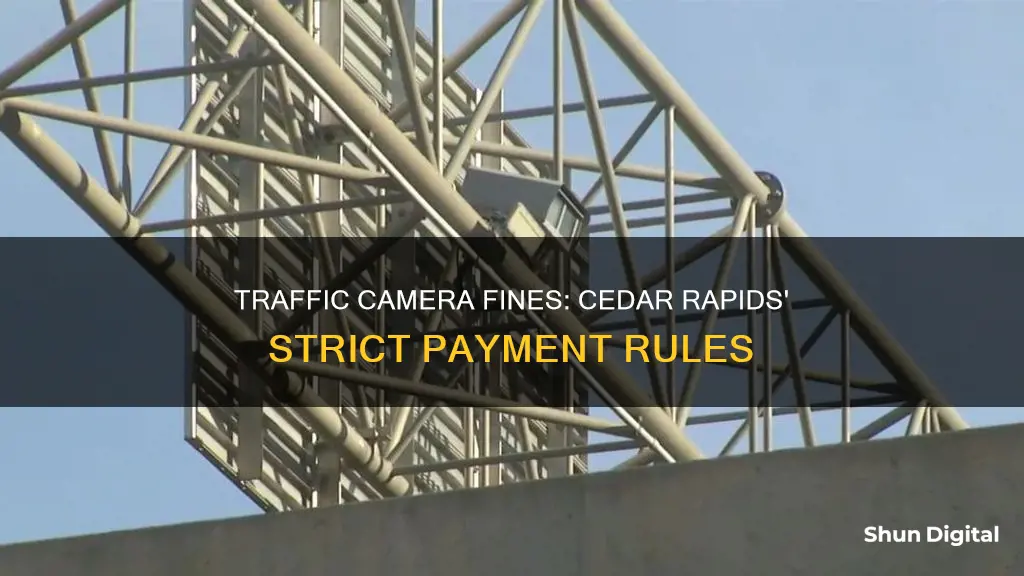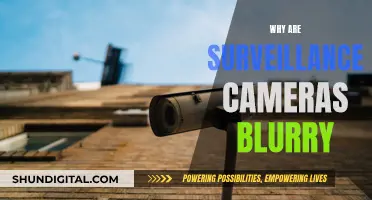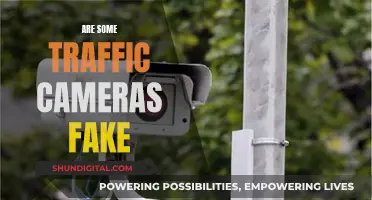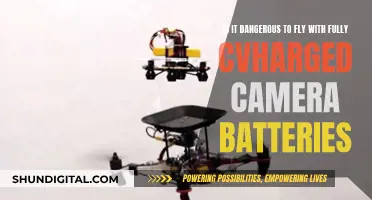
Cedar Rapids, Iowa, has a number of traffic cameras in operation, which issue fines for speeding and red-light violations. The city has faced challenges with a significant number of unpaid traffic camera fines, with some motorists questioning the validity of the citations and the lack of transparency around the allocation of fine revenue. As of 2024, Cedar Rapids has implemented a new collection strategy, including a 25% late payment penalty and submission of eligible debts to the Iowa Income Offset Program. This strategy is intended to address the issue of outstanding fines, which previously posed a challenge for the city in terms of revenue collection and court proceedings.
| Characteristics | Values |
|---|---|
| Time to pay the fine | 30 days |
| Late payment penalty | 25% |
| Fine amount | $75 for speeding, $100 for red-light violation |
| Non-payment consequences | Court judgment, collection agency involvement, Iowa Offset Program, vehicle registration renewal restriction, license renewal restriction |
What You'll Learn
- The city may file a municipal infraction against you, which could result in a court judgment
- The city could seek the assistance of a collection agency
- The debt could be submitted to the Iowa Income Offset Program
- The city could seek voluntary payment
- The city could initiate a municipal infraction process to determine liability

The city may file a municipal infraction against you, which could result in a court judgment
If you do not pay your Cedar Rapids traffic camera fine within 30 days of receiving your ticket, the city may file a municipal infraction against you. This could result in a court judgment against you for filing fees and court costs, in addition to the civil penalty stated in the notice.
The city's ability to file a municipal infraction is outlined in Cedar Rapids Municipal Code 61.138, which states that the city may file an infraction against the vehicle owner if they do not pay the fine by the due date or successfully challenge the citation. The code also specifies that the city can seek a judgment for the applicable civil fine, plus state-mandated filing fees and court costs.
If a judgment is entered in favor of the city in the municipal infraction proceeding, they may pursue enforcement of the judgment, including interest, and collection of that judgment. This could include referring the case to the State of Iowa Income Offset program, which can withhold the amount owed from winnings or tax returns.
It is important to note that while the city has the right to file a municipal infraction, they may first seek voluntary payment of the fine by sending a written request to the vehicle owner and/or referring the matter to a private collection agency.
Obtain Traffic Camera Footage: Burbank's Easy Process
You may want to see also

The city could seek the assistance of a collection agency
If a judge determines that the recipient of a Cedar Rapids traffic camera citation is liable for the fine and they do not pay it, the city could seek the assistance of a collection agency. This is one of several options available to the city to pursue debt collection, including seeking voluntary payment or submitting the debt to the state's income offset program.
In 2024, the city's collection agency was Municipal Collections of America, Inc. (MCOA). MCOA mailed notices to people with outstanding fines, informing them of changes to the collection strategy, which included a 25% late payment penalty and submission of eligible debts to the Iowa Income Offset Program. A 45-day grace period was offered for citations issued before November 1, 2017.
While some people have reported that unpaid citations have ended up with collection agencies and affected their credit reports, others have stated that they never heard anything about their unpaid fines again. It is important to note that the city of Cedar Rapids cannot send unpaid tickets to a credit bureau, but they can turn them over to a collection agency.
Traveling with Camera Batteries: A Guide to Safe Packing
You may want to see also

The debt could be submitted to the Iowa Income Offset Program
If you receive a traffic ticket in Cedar Rapids, it's important to pay it promptly to avoid additional fees or losing your license. If you don't pay your Cedar Rapids traffic camera fine, the city has the option to submit the debt to the Iowa Income Offset Program. This program allows the state to settle the debt through a violator's income tax refund.
The Iowa Income Offset Program is a debt collection mechanism authorized by Iowa Code 8A.504. If your debt is submitted to this program, it means that the state of Iowa can withhold any state income tax refund that you may be owed until your debt is paid. This is one of the ways that the state can collect debt owed to it.
The Iowa Department of Revenue is responsible for recovering debt owed to the state through income tax offsets. If your tax refund is withheld due to outstanding debt, you will receive a notice from the Department of Revenue. It's important to note that if you receive a tax offset notice, you should not pay the amount towards your debt because the withheld amount is already paid to the state.
In addition to the Iowa Income Offset Program, there are other consequences for failing to pay your traffic camera fine in Cedar Rapids. The city may initiate a municipal infraction process to determine liability, and if found liable, the city could seek voluntary payment or the assistance of a collection agency. Your driver's license may also be suspended until you enter into a payment plan.
Exploring Adobe Camera Raw: Mastering the Undo Functionality
You may want to see also

The city could seek voluntary payment
If a judge determines that the recipient of a Cedar Rapids traffic camera citation is liable for the fine and they do not pay it, the city has several options for recourse. One option is to seek voluntary payment from the vehicle owner. This typically involves sending a written request for payment to the vehicle owner. If the owner still does not pay, the city may then refer the matter to a private collection agency.
According to a Cedar Rapids Municipal Code, if the recipient of an automated traffic citation does not pay the fine by the due date or successfully challenge the citation, the city may file a municipal infraction against the vehicle owner. This could result in a court judgment against the owner for filing fees and court costs, in addition to the original fine. The city may also pursue enforcement of the judgment, including interest, and collection of that judgment.
The city of Cedar Rapids has struggled with getting people to pay their traffic camera fines. As of February 2024, the city had 221,000 outstanding tickets. In the past, the city has turned to collection agencies to help recoup these unpaid fines. As of September 2024, the city had collected $2.6 million in fines, with $1.7 million going to the camera vendor and the remainder going to city coffers.
Surveillance in Subway: Cameras in the Sandwich Shop?
You may want to see also

The city could initiate a municipal infraction process to determine liability
If a Cedar Rapids traffic camera ticket is not paid, the city can initiate a municipal infraction process to determine liability. This means that the city can file a municipal infraction against the vehicle owner, which could result in a court judgment against them for filing fees and court costs, in addition to the original fine. This is outlined in Cedar Rapids Municipal Code 61.138.
The municipal infraction process starts court proceedings, and if a judge determines that the recipient of the ticket is liable, the city has several options for recourse. These options include seeking voluntary payment, submitting the debt to the state's income offset program to settle the debt through the violator's income tax refund, or seeking the assistance of a collection agency.
The city of Cedar Rapids has a large number of outstanding traffic camera citations, and they have implemented new collection strategies to address this issue. One strategy includes a 25% late payment penalty and submission of eligible debts to the Iowa Income Offset Program. The city has also engaged the services of a collection agency, Municipal Collections of America, Inc. (MCOA), to notify people with outstanding fines and offer a 45-day grace period for citations issued before a certain date.
While some individuals may choose to ignore their traffic camera tickets, it is important to note that there can be consequences for non-payment. The city has the legal right to pursue enforcement of the judgment, and collection of that judgment may include referral to the state's income offset program or the use of a collection agency. Therefore, while there may be a perception that these tickets are not taken seriously or are difficult to enforce, the city of Cedar Rapids is taking active steps to address non-payment and ensure compliance with traffic regulations.
Broadcasting Your Camera: Computer Connection Tips
You may want to see also
Frequently asked questions
If a Cedar Rapids traffic camera fine is not paid, the city may file a municipal infraction against the recipient, which could result in a court judgment for filing fees and court costs in addition to the civil penalty.
The late payment penalty for Cedar Rapids traffic camera fines is 25% per Cedar Rapids Municipal Code 61.138.
If you ignore a Cedar Rapids traffic camera fine, the city may initiate a municipal infraction process to determine liability. The city may also refer the matter to a collection agency or submit the debt to the Iowa Income Offset Program, which can collect the debt through a violator's income tax refund.
It is unclear whether Cedar Rapids traffic camera fines will affect your credit score. Some people report that the fines have ended up on their credit report, while others say they have not seen any impact.
Yes, Cedar Rapids can submit eligible debts to the Iowa Income Offset Program, which can collect the debt through a violator's income tax refund.







